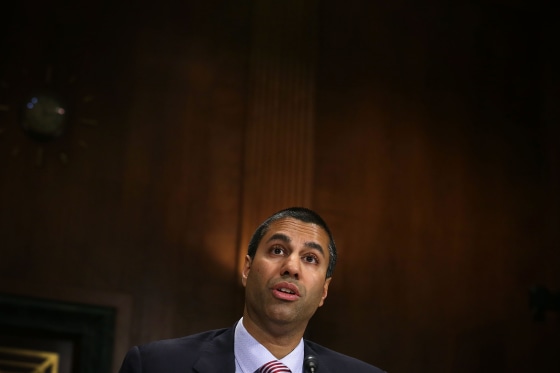Much of the discussion on net neutrality has centered on the giant internet service providers and their quest to overturn the Obama-era rules, arguing they have stifled innovation and investment.
But small internet service providers — which are not just an alternative for rural Americans, but sometimes the only choice — split on whether net neutrality rules should be gutted.
Just 17 broadband providers serve 93 percent of the U.S. population, according to the Federal Communications Commission, leaving it up to 3,000 other companies — many of which are small, mom and pop operations — to serve the remaining population.
In June, 40 small internet service providers sent FCC Chairman Ajit Pai a letter supporting the current net neutrality rules and sharing their concern that without them, they'll be crushed by the cable giants.

"We have reservations about any plan at the FCC that seeks to enhance their market power without any meaningful restraints on their ability to monopolize large swaths of the internet," the group wrote.
Pai released his plan last Wednesday for ending the 2015 rules, which would reclassify the internet as an information service instead of a utility, taking a "light-touch" approach to regulation.
That means internet service providers will be able to act as toll keepers, prioritizing traffic, controlling the speed at which some pages load — a practice known as "throttling" — and even blocking access to certain sites. It all comes with the caveat that they'll have to publicly disclose if they engage in these practices.
Overbearing regulation
Elizabeth Bowles, president and chairwoman of Aristotle, a wireless broadband provider in Arkansas with approximately 800 customers, said Pai's proposal will remove a lot of "regulatory burden" that doesn't apply to what Aristotle does.
Net neutrality rules were "putting layers on the way we already ran our business," and have created "a lot of uncertainty," Bowles said. She said there hasn't been a "huge sea change" in business for Aristotle since the net neutrality rules were enacted in 2015.
However, she said general conduct rules have created a cloud of uncertainty. Those rules give the FCC the right to sanction companies on a case-by-case basis over practices that don't violate the bright line rules — the set of regulations that require internet service providers to treat all traffic equally.
The FCC has, however, reserved the right, through a "general conduct rule," to review these companies' business practices and to sanction a company if they're doing something that is believed to affect the openness of the internet. That's where the current rules become a burden for smaller internet service providers, Bowles said.
Related: The backlash is building over the plan to gut net neutrality
For Aristotle, and other small internet service providers, that meant retaining counsel to ensure they were meeting rules they perceived as unclear. While those legal bills wouldn't be much for the large internet service providers, Bowles said they can be significant for smaller companies.
The Wireless Internet Service Providers Association called it a "disproportionate burden" in a public comment to the FCC filed in July.
"The vague and amorphous general conduct standard creates an environment of substantial and unquantifiable uncertainty that chills investment, innovation and deployment," the industry trade group said.
Greater transparency
But on the other end of the argument is Sonic, a gigabit fiber internet provider based in the San Francisco Bay Area. The company's leadership says net neutrality rules haven't stifled expansion or innovation. In fact, it is advocating to keep the existing framework.
"Sonic fundamentally believes in maintaining unlimited, open access to the internet and that a competitive market is necessary for customers to have the best service at an affordable price. Unlike net neutrality opponents, we do not believe that Title II [net neutrality] is a barrier to us or other small ISPs," Sonic CEO Dane Jasper said in an email to NBC News.
In the coming weeks, the company plans to hand out coffee at various public transportation stops in the Bay Area, with the FCC's phone number conveniently printed on the cups.
As Bowles sees it, the FCC may be doing Americans a service when it votes on Pai's proposal on Dec. 14.
Bowles is a supporter of the "bright line rules" and said she believes Congress should pass legislation to make them enforceable — but it's not the FCC's job.
"The biggest favor the FCC can do for the American consumer is to force the companies to be transparent," she said.
As a Tier 2 internet service provider, Aristotle does business with larger Tier 1 networks to expand its services. Aristotle plans to continue operating as usual — without blocking, throttling, or offering faster broadband service for a price, known as paid prioritization, she said. If a company Aristotle does business with chooses to engage in paid prioritization, it could have an effect on Aristotle's business.
"I have concerns about how much this frees up the large internet service providers to play that game," Bowles said. However, if the proposal passes, those companies would have to disclose when they engage in practices such as paid prioritization.
This would then allow Bowles to take her business to a partner who doesn't do these things — keeping the experience reliable, consistent and affordable for consumers.
"This is a highly competitive environment and unless you are in rural America, where there are no choices ... then you have a choice," Bowles said. "This puts the power in the hands of the consumer to make an informed choice. That is why the internet has worked up to now."
NBC News is owned by Comcast, the nation’s largest internet service provider.
